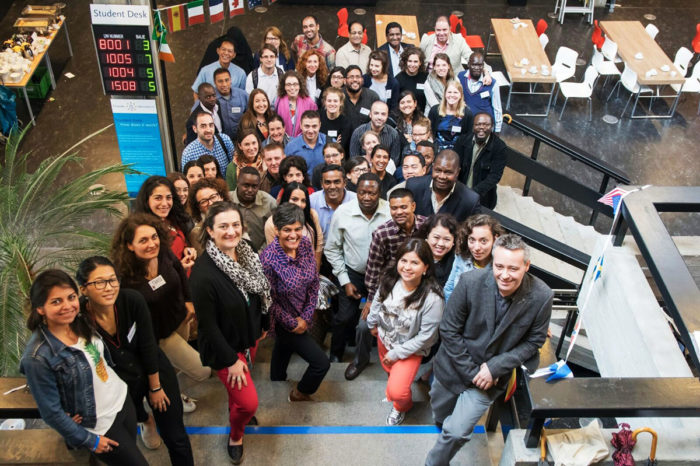
Our Mission
The Americas Network on Nationality and Statelessness is a network of civil society organizations, academic initiatives, and individual experts committed to address statelessness in the Americas. We believe that all human beings have a right to a nationality and that those who lack nationality altogether – stateless persons – are entitled to adequate protection.
The first annual conference of the Red ANA took place on October 22nd, 2015 at the Inter-American Commission on Human Rights (IACHR) in Washington DC. Speakers included representatives of the UNHCR, the Governments of Chile and Brazil and the Rapporteur on the Rights of Migrants of the IACHR.
Protocol
1. Mission Statement
The Americas Network on Nationality and Statelessness (Red ANA) is a network of non-governmental organizations, academics and individual experts committed to address statelessness in the Americas. We believe that all human beings have a right to a nationality and the rights and protections that come along with it. We are committed to preventing the arbitrary deprivation of nationality and statelessness, and dedicated to identifying, protecting, and assisting those arbitrarily deprived of nationality and stateless people in the Americas.
2. Primary Activities
To promote the Mission Statement, the Red ANA will:
1 – Engage in Knowledge Sharing
- Maintain a website with updated information regarding what organizations and individuals work on issues relating to statelessness and nationality in the Americas.
- Maintain an email list where members can share information and advocacy opportunities. The Red ANA will also maintain email lists for smaller working groups (detailed further below under section 5).
- Produce a newsletter with updates about activities.
2 – Engage in Capacity Building
- Hold a webinar monthly or bi-monthly with information on the status of statelessness and nationality in a particular country or with a specific thematic focus.
- Hold a conference every year on the status of statelessness in the Americas.
- Hold country meetings to bring together members, identify areas of collaboration, and articulate priorities and projects.
3 – Engage in Advocacy
- Publicize advocacy initiatives of member organizations.
- Issue statements on pressing nationality and statelessness problems, which members can sign onto (detailed further below under section 4).
3. Membership
Non-governmental organizations, university and independent research centers, academics, and individuals may become members of the Americas Network on Nationality and Statelessness. Membership is approved by a majority vote of the Steering Committee.
- 1 – Agree with the mission statement of the Americas Network on Nationality and Statelessness.
- 2 – Provide legal, social and other support services, carry out research, teaching or training, or do advocacy or policy work on behalf of stateless persons or those at risk of statelessness.
- 3 – Be based in the Americas, or carry out work on the Americas, with either a regional or country-specific focus.
- 4 – Membership is not extended to political parties or governmental and inter-governmental institutions (including National Human Rights Institutions affiliated with government) although individuals working for such institutions may join in a purely personal and individual capacity.
To apply for membership, organizations or individuals must:
Members’ logos will appear on the Red ANA webpage (americasns.org/membership). In addition, Red ANA will benefit from members if, according to members’ capacity and where necessary, members can:
- 1 – Provide information or updates about matters within their field of expertise.
- 2 – Inform Red ANA of developments in a given country or field of research, in order to keep Red ANA’s website and publications updated.
- 3 – Give a webinar presentation to Red ANA members in their field of expertise (we expect to have one webinar per month).
- 4 – Participate in panels and conferences hosted by Red ANA (provided of course the requests are reasonable and made in advance).
- 5 – Participate in research and drafting, depending on Red ANA strategic priorities, which would always be carried out in collaboration with Red ANA and other member organizations. Members may raise any issue related to the functioning of the Red ANA with the Steering Committee. Members may not use the Red ANA logo, carry out activities, or issue statements in the name of the Red ANA without approval from the Steering Committee.
4. Advocacy activities
All public activities will be carried out in consultation with members.
Beginning in 2016, Red ANA will make public statements on pressing issues of nationality and statelessness. Red ANA will circulate draft statements to members who will choose whether to actively sign on to statements.
Statements will be presented in the following format:
Example: The undersigned organizations, members of the Red ANA, express their concern…
With those members that sign onto the statement listed underneath.
5. Forms of communication
Communications within Red ANA will occur at three different levels. Red ANA will host:
- 1 – An open mailing list, which members of the public can sign onto through the Red ANA website. This will be a one-way communication: Red ANA will provide updates about its activities and developments in the area of nationality and statelessness in the Americas.
- 2 – A membership mailing list, open to members only. Members will use this list to engage in substantive discussions, in addition to providing updates about their activities and organizing events.
- 3 – Working group mailing lists. These will be used by smaller groups of members organized around specific countries, topics or areas of research, in order to actively carry out specific projects.
Annual Report
Click here to download The Anual Report of your preference

